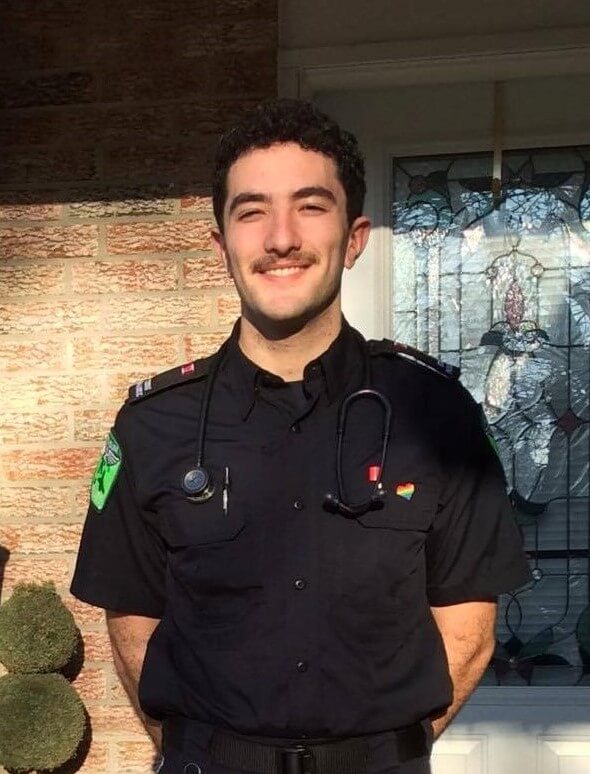Paramedic
Bring your leadership to the dynamic field of Paramedicine.
- Opportunity to work and learn alongside active paramedics in the paramedic practicum experience in the final term of the program
- Graduates are eligible to write the Ontario Advanced Emergency Medical Care Attendant Exam and may be employed in paramedic services throughout Ontario and Canada
- Graduates may also choose to continue studies in the Advanced Paramedic program offered at Algonquin College to practice at higher levels of paramedicine
Program Availability and Schedule
Availability
Open
Closed
Waitlisted
Start Term
Availability
International
Availability
Competitive?
Fall 2025
Yes
Winter 2026
No
Schedule
Data is currently unavailable for this program. Please take a moment to report this via our Website Feedback Form. Thank you!
Program Summary
Credential
Program Delivery
Program Code
Area of Interest
School
Campus
Work Integrated Learning
Eligible for Post-Graduation
Work Permit?
CIP Code(s): 51.0904
Graduates from this top-rated Paramedic Ontario College Diploma program are ready for success in the workforce. Paramedics fill a critical role in our health care system with employment opportunities in rural and urban paramedic services. This program combines applied and theoretical experiences to provide you with all the necessary skills.
In this program, you learn all aspects of paramedicine, how to deal with emergencies, and develop the means to communicate with patients, family members and healthcare professionals. In the final term of the program, you get the chance to put your knowledge and skills into practice through a paramedic practicum experience. It is in this setting that you experience a wide variety of calls and are able to display proficiency working as a necessary member of a team. This 420-hour practicum provides you with the opportunity work and learn alongside active paramedics....(read more)
Overview
Bring your leadership to the dynamic field of Paramedicine.
Graduates from this top-rated Paramedic Ontario College Diploma program are ready for success in the workforce. Paramedics fill a critical role in our health care system with employment opportunities in rural and urban paramedic services. This program combines applied and theoretical experiences to provide you with all the necessary skills.
In this program, you learn all aspects of paramedicine, how to deal with emergencies, and develop the means to communicate with patients, family members and healthcare professionals. In the final term of the program, you get the chance to put your knowledge and skills into practice through a paramedic practicum experience. It is in this setting that you experience a wide variety of calls and are able to display proficiency working as a necessary member of a team. This 420-hour practicum provides you with the opportunity work and learn alongside active paramedics.
The program is delivered through:
- in-class theory
- online learning
- practical/laboratory courses
- high-fidelity simulation
- hospital clinicals
- practicums
At the conclusion of the program, you are able to write the Ontario Advanced Emergency Medical Care Attendant exam.
After graduating, you may be employed in Paramedic Services throughout Ontario and Canada. Graduates may also choose to continue their studies to obtain advanced training to practice at higher levels of paramedicine.
SUCCESS FACTORS
This program is well-suited for students who:
- Are high academic achievers with proven postsecondary success.
- Are mature individuals with excellent communication skills.
- Possess strong leadership and time management skills.
- Are looking for a professional career that is dynamic and challenging.
- Are able to work effectively in challenging environments and in stressful situations.
Courses
Programs at Algonquin College are delivered using a variety of instruction modes. Courses may be offered in the classroom or lab, entirely online, or in a hybrid mode which combines classroom sessions with virtual learning activities. Upon registration, each full-time student is provided an Algonquin email account which is used to communicate important information about program or course events.
Code:
ENL1423T
Course Name:
Communication in Healthcare
Course Description:
Students learn effective communication skills, as well as documentation, including protocols and industry standards for documentation includ... + Read More
Hours:
28.0
Code:
PAR3618
Course Name:
Patient Care Laboratory I
Course Description:
Students apply selected assessment and intervention skills for the provision of pre-hospital emergency care in simulated laboratory settings... + Read More
Hours:
56.0
Code:
PAR3619
Course Name:
Theory of Patient Care 1
Course Description:
Students learn selected theory behind the assessment and intervention skills required for the provision of pre-hospital emergency care. Stud... + Read More
Hours:
42.0
Code:
PAR3621
Course Name:
Mastering Medical Physiology
Course Description:
Students develop essential study skills to master anatomy and physiology. Students participate in small group learning, creating mind maps a... + Read More
Hours:
7.0
Code:
PAR3623
Course Name:
Medical Physiology I
Course Description:
Students develop essential knowledge of the structure, function and physiology of the human body in addition to the acquisition of appropria... + Read More
Hours:
70.0
Code:
PAR3638
Course Name:
Professional Development
Course Description:
Professions are complicated far beyond the skills needed to "do the work". It is imperative to comprehend labour relations, legislation, eth... + Read More
Hours:
42.0
Code:
PAR4610
Course Name:
Patient Lifting and Movement I
Course Description:
Students are provided with a job-specific level of fitness in order to safely perform the daily physical tasks of a professional paramedic. ... + Read More
Hours:
14.0
Code:
PAR3600
Course Name:
Pharmacology
Course Description:
Drug sources, drug categories and classifications, drug indications and adverse reaction, interactions and toxicity are examined. Drug dosag... + Read More
Hours:
56.0
Code:
PAR3601
Course Name:
Paramedicine 1
Course Description:
Students focus on the epidemiology, etiology, pathophysiological processes, resulting clinical features, complications and patient managemen... + Read More
Hours:
112.0
Code:
PAR3615
Course Name:
Medical Physiology II
Course Description:
Students develop essential study skills to master anatomy and physiology. Students participate in small group learning, creating mind maps a... + Read More
Hours:
42.0
Code:
PAR3620
Course Name:
Theory of Patient Care 2
Course Description:
Students learn selected theory behind the assessment and intervention skills required for the provision of pre-hospital emergency care, and ... + Read More
Hours:
42.0
Code:
PAR3622
Course Name:
Patient Care Laboratory 2
Course Description:
Students continue to apply selected assessment and intervention skills required for the provision of pre-hospital emergency care in simulate... + Read More
Hours:
56.0
Code:
PAR4606
Course Name:
Patient Lifting and Movement II
Course Description:
Students develop a general and job-specific level of fitness. Emphasis is placed on profession-specific lifting requirements. Cardiovascular... + Read More
Hours:
14.0
Code:
PSY4705
Course Name:
Psychopathology
Course Description:
The scientific discipline of psychopathology begins in the 20th century and provides a framework for classifying and treating mental disorde... + Read More
Hours:
42.0
Code:
MVM4626
Course Name:
Emergency Vehicle Operation
Course Description:
Both theory and simulation driving sessions emphasize driver communications, perceptions, effective vehicle operation, hazard avoidance and ... + Read More
Hours:
15.0
Code:
PAR3602
Course Name:
Paramedicine 2
Course Description:
Students focus on the epidemiology, etiology, pathophysiological processes, resulting clinical features, complications and patient managemen... + Read More
Hours:
112.0
Code:
PAR3608
Course Name:
Paramedic Simulation 1
Course Description:
Through simulated scenarios and small group discussions, students integrate critical thinking skills and didactic knowledge to explore asses... + Read More
Hours:
28.0
Code:
PAR3630
Course Name:
Theory of Patient Care 3
Course Description:
Students focus on clinical reasoning skills that apply to patient assessment and development of a patient management plan. Using prioritizat... + Read More
Hours:
28.0
Code:
PAR3631
Course Name:
Patient Care Laboratory 3
Course Description:
Students are presented with tutorial materials which require problem-solving skills. The learning is contingent on the students' input, whic... + Read More
Hours:
56.0
Code:
PAR3634
Course Name:
Paramedic Practicum 1
Course Description:
Valuable practical field experience is emphasized. Under direct supervision of a paramedic crew students participate in the performance of b... + Read More
Hours:
84.0
Code:
PAR3640
Course Name:
Hospital Clinical Practicum
Course Description:
Practical clinical experience is provided such that students apply the knowledge and skills related to patient assessment, evaluation and ma... + Read More
Hours:
80.0
Code:
PAR3650
Course Name:
Medical Directives Theory
Course Description:
Students will explore the theory of paramedicine that fall within the Ontario Ministry of Health Advanced Life Support Patient Care Standard... + Read More
Hours:
14.0
Code:
PAR3651
Course Name:
Medical Directives Lab
Course Description:
Students will acquire the practical skills and abilities necessary to perform advanced assessment and intervention to both trauma patients a... + Read More
Hours:
28.0
Code:
PAR3609
Course Name:
Paramedic Simulation 2
Course Description:
Students experience low frequency, high acuity emergency call types in a high fidelity simulation setting. Students are provided the opportu... + Read More
Hours:
28.0
Code:
PAR3641
Course Name:
Paramedic Practicum 2
Course Description:
A concentrated period of field practical experience is provided. Students experience a wide variety of calls and demonstrate competence in w... + Read More
Hours:
420.0
Code:
PAR3646
Course Name:
Paramedic Consolidation
Course Description:
Students relate and integrate theoretical concepts previously learned in clinical and field placements. Students participate in interprofess... + Read More
Hours:
56.0
Code:
GED0620
Course Name:
General Education Elective
Course Description:
Students choose one course, from a group of general education electives, which meets one of the following five theme requirements: Arts in S... + Read More
Hours:
42.0
Careers & Pathways
Careers
Graduates are eligible to write the Ontario Ministry of Health licencing exam Advanced Emergency Medical Care Attendant (A-EMCA). Experience and further training may lead to opportunities as advanced and critical care paramedicine. In addition, the Paramedic diploma has proved valuable to those seeking employment as firefighters and police officers.
Pathways
Please note: There may be more pathways available for this program than are listed here. Please use our Pathways search tool to see every option.
Learning Outcomes
The graduate has reliably demonstrated the ability to:
- Communicate and interact effectively and appropriately with patients and others.
- Assess patients using relevant theory and practices and in compliance with current legislation, regulations, standards, and best practice guidelines.
- Establish patients` treatment and transport priorities based on assessment findings.
- Implement preventive and therapeutic patient management strategies to maintain and promote patients` well-being in compliance with current legislation, regulations, standards, and best practice guidelines.
- Integrate and perform delegated controlled medical acts in a simulated, clinical, and field setting.
- Evaluate in an ongoing manner the effectiveness of patient management strategies used and adapt or change strategies to provide optimal care for patients.
- Report and document patient information completely, accurately, and in a timely manner, in compliance with current legislation, regulations, standards, and applicable policies and procedures in a simulated, clinical, and/or field setting.
- Ensure personal safety and contribute to the safety of partners, patients, and others.
- Ensure the operational safety and preparedness of an ambulance and its equipment and operate an ambulance-type vehicle in a simulated setting.
- Collaborate with a broad range of personnel such as first responders, paramedics, emergency services personnel, health care professionals and other allied health care workers.
- Integrate and meet legal, ethical, and professional responsibilities while providing optimal care for patients.
- Identify and apply discipline-specific practices that contribute to the local and global community through social responsibility, economic commitment and environmental stewardship.
Tuition & Fees
Get an idea of how much each semester will cost with our Tuition and Fee Estimator.
2024/2025 Academic Year
Tuition and related ancillary fees for this program can be viewed by using the Tuition and Fees Estimator tool at www.algonquincollege.com/fee-estimator.
Further information on fees can be found by visiting the Registrar`s Office website at www.algonquincollege.com/ro.
Fees are subject to change.
Additional program related expenses include:
- The certification fee for the Ontario A-EMCA examination set by the Ministry of Health is approximately $300.
- Textbooks, manuals, and printing cost approximately $2,000 in year one and $1,000 in year two. A uniform and supplies cost approximately $1,500. Some supplies can be purchased at the campus store.
- For more information visit www.algonquincollege.com/coursematerials.
Admissions Requirements
All applicants must satisfy both College Eligibility and Program Eligibility requirements.
College Eligibility
- Ontario Secondary School Diploma (OSSD) or equivalent. Applicants with an OSSD showing senior English and/or Mathematics courses at the Basic Level, or with Workplace or Open courses, will be tested to determine their eligibility for admission; OR
- Academic and Career Entrance (ACE) certificate; OR
- General Educational Development (GED) certificate; OR
- Mature Student status (19 years of age or older and without a high school diploma at the start of the program). Eligibility may be determined by academic achievement testing for which a fee will be charged.
Be advised that all candidates must meet BOTH College and Program eligibility.
Program Eligibility
- English Grade 12 (ENG4C or equivalent) with a grade of 70% or higher.
- Mathematics Grade 12 (MAP4C or equivalent) with a grade of 70% or higher.
- Biology Grade 11 or 12 with a grade of 70% or higher.
- Chemistry Grade 11 or 12 with a grade of 70% or higher.
- All applicants must complete an assessment of their knowledge and skills through the Test Centre, and pay an exam fee. Results from the Algonquin College Health Program Admissions Test (AC-HPAT) will be utilized to establish minimum eligibility and applicant ranking. The AC-HPAT can only be written once per academic cycle. For further information on the HPAT and how to book your assessment, please visit Algonquin`s Test Centre.
- Applicants with international transcripts must provide proof of the subject-specific requirements noted above and may be required to provide proof of language proficiency. Domestic applicants with international transcripts must be evaluated through the International Credential Assessment Service of Canada (ICAS) or World Education Services (WES).
- IELTS-International English Language Testing Service (Academic) Overall band of 6.5 with a minimum of 6.0 in each band; OR TOEFL-Internet-based (iBT) Overall 88, with the minimum of 22 in each component: Reading 22; Listening 22; Speaking 22; Writing 22; OR Duolingo English Test (DET) Overall 120, minimum of 120 in Literacy and no score below 105.
Not sure if you meet all of the requirements? Academic Upgrading may be able to help with that: https://www.algonquincollege.com/access/.
Proof of these 3 requirements are to be submitted to the department upon acceptance to the program prior to August 1st.
- Standard First Aid Certificate and Current Basic Cardiac Life Support Certificate C.P.R. (or CPR HCP).
- Signed Mandatory Paramedic Information Sheet.
- Criminal Record Check - Vulnerable Sector (Students must be 18 years of age to apply).
Clinical Placement Eligibility:
To be eligible for placement, applicants must complete the list of required documents below and have proof of all when meeting with ParaMed to be cleared for placement during Level 02. All associated costs are to be paid by the applicant.
- Seasonal influenza immunization
- COVID-19 vaccination (mandatory) ParaMed
- Placement Pass Health Form (with serology): Measles/Mumps/Rubella;Varicella;/Tuberculosis; Pertussis; Polio; Hepatitis B; Communicable Diseases Attestation
- Standard First Aid
- CPR HCP (Level C is no longer accepted)
- N95 fit testing (provided by Algonquin College)
- Criminal Record Check - Vulnerable Sector
- WHMIS (provided by us)
- AODA - Accessibility Training (provided by us)
- MOL - Safety Awareness for Workers Training (provided by us)
- Driver`s License
- Affirmation of mandatory second uniform and safety items
It is your responsibility to obtain the PRCSVS from your local Police Department prior to the deadline identified by your Department and to pay any associated costs. It may take a long time to obtain this documentation; please submit your application as early as possible.
Hospital and Field Practicums require Health and Safety, WHMIS and OWHSA training, Crisis Management and De-escalation Techniques training, as well as High Risk Personal Protective Equipment training prior to placements. There are costs associated with this training that should anticipated by the students, which are not covered by tuition fees.
Although not a program eligibility requirement, you must be aware that in order to gain employment as a Paramedic you must obtain a Class F driver`s licence or equivalent. Students should be prepared to have their full Class F License prior to the start of their second year of study to be able to start applying for jobs. The Class F licence is not part of the program of study and you should refer to the Ministry of Transportation`s guidelines and requirements. For further information click on the link below: http://www.mto.gov.on.ca/english/handbook/bus/section1-3-3.shtml.
Application Information
PARAMEDIC
Program Code 0620X01FWO
Applications to full-time day programs must be submitted with official transcripts showing completion of the academic admission requirements through:
ontariocolleges.ca
60 Corporate Court
Guelph, Ontario N1G 5J3
1-888-892-2228
Students currently enrolled in an Ontario secondary school should notify their Guidance Office prior to their online application at www.ontariocolleges.ca.
Applications for Fall Term and Winter Term admission received by February 1 will be given equal consideration. Applications received after February 1 will be processed on a first-come, first-served basis as long as places are available.
International applicants please visit this link for application process information: https://algonquincollege.force.com/myACint/.
For further information on the admissions process, contact:
Registrar`s Office
Algonquin College
1385 Woodroffe Ave
Ottawa, ON K2G 1V8
Telephone: 613-727-0002
Toll-free: 1-800-565-4723
TTY: 613-727-7766
Fax: 613-727-7632
Contact: https://www.algonquincollege.com/ro
Additional Information
Program Resources
The Paramedic program is an intensive program of study delivered at the Woodroffe Campus in current facilities.
The Paramedic program is an integrated program of study, which builds on the base knowledge and skills of each previous term. Consequently, all courses in each level must be successfully completed in order to progress to the next level. A maximum of four years is allowed to complete the program.
Contact
Ashley Murfin
Program Coordinator
Room P112M
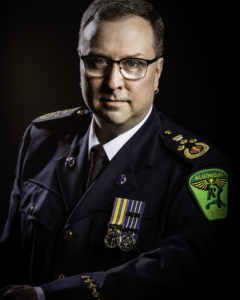
Ashley has a passion for sharing knowledge and helping others succeed. As a proud alumni of the 1993-94 Algonquin College Paramedic Program, he was named the most dedicated student.
Ashley has a Master’s in Health Services Management from Charles Sturt University, a Bachelor in Physical Education (Hon), from the University of Ottawa and a Teacher & Trainer of Adults Certificate from Algonquin College. During the OPALS Study he completed his ACP Program with the Michener Institute (1998) and his Advanced Flight Paramedic Certification with Sunnybrook. Ashley has worked as a Land Paramedic in both the urban and rural environments and as an Advanced Care Flight Paramedic on 7791.
Ashley has been teaching and preceptoring throughout his career, including the Algonquin Paramedic and Advanced Paramedic Programs, Pre-Service Firefighter Program, Ottawa Base Hospital , Special Operations, Incident Command System, as well as, leadership principles to new Operations Superintendents. He was part of the team that wrote and taught the first ACP Program offered at Algonquin College (2000).
With the Ottawa Paramedic Service at the rank of Commander, he has held several portfolios including: Operations, Performance Management & Special Operations. Ashley helped build the first Tactical and Paramedic Support Unit Specialty Teams in Ottawa. He has been the incident commander and lead planner for many major events and special visits in Ottawa, most notably Canada Day Celebrations, Presidential and Royal Visits. He is the co-founder of the OPS Diversity Champion Program and actively promotes diversity.
Ashley has received several honours and awards including; The Emergency Medical Services Exemplary Service Medal from the Governor General of Canada, The 22 Year Service Medal from the Ottawa Paramedic Service, The City Managers Award of Excellence and the Public Hero’s Award from IDI Ottawa.
Stephen DeFilippi
Professor
Room P112

Stephen is an educator with a rich background in diverse fields including his commitment to public service in Para-medicine, documentary & film production studies, the culinary arts and alpine climbing. He is a passionate and experienced educator dedicated to lifelong learning and student development with extensive experience teaching at various levels. Stephen’s first teaching job was as a substitute teacher for Grade 11 biology, physics & environmental studies.
He is known for their innovative teaching methods, which combine practical experience with theoretical knowledge, fostering a dynamic and engaging learning environment. Stephen briefly studied with Professor Emeritus Donald Woods of McMaster university while developing theories and practices of problem based learning (PBL) and case based learning (CBL) models which continue to evolve to this day. Both methodologies foster student centred learning platforms which he has formalized for prehospital emergency medical education.
Deanna Schofield
Professor
Room P112
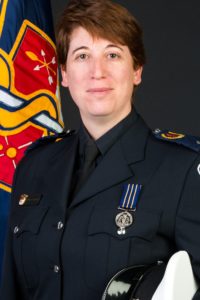
Deanna is an experienced, positive coach and motivator for students and paramedics to reach their full potential as informal and formal servant leaders. As an EMS Coordinator and Superintendent, Deanna worked to improve bias aware teaching practices and aligning assessments of paramedic employees and new hires with bona fide job requirements. Deanna uses and has taught the GROW model of coaching for performance to hundreds of municipal staff to incorporate formal check-ins and informal coaching moments to improve success.
A paramedic graduate from Holland College, PEI, she started working in her hometown Halifax, Nova Scotia, the day after graduation in the spring of 1999. She also worked as a triage paramedic in the tertiary care center, Queen Elizabeth II Emergency Room before returning to complete her Advanced Care Paramedic program. As one of a small group of out-of-province paramedics that challenged the barriers to transfer credentials, she joined the Ottawa Paramedic Service in 2001.
With the Ottawa Paramedic Service, she highlights her roles through the years as a teacher, preceptor, hospital liaison, project officer for the Diversity Champion Program, and the Unintentional Overdose Prevention Task Force partnering with police, fire, community non-profits and Ottawa Public Health. She was a team member on many projects that improved pre-hospital care and built regional solutions to vulnerable patient care issues such as the TED program (Targeted Engagement and Diversion), STEMI bypass changes, and the CHEO NeoNatal Transport Unit.
In her volunteer time, Deanna is a founding member of the Paramedic Women’s Community, member of the Professional Paramedic Association of Ottawa (PPAO) Helping Every Local Paramedic (HELPfund), Paramedic Ride, a Scouter and basketball coach.
As a cross-cultural competency facilitator, Deanna continues to work to recognize bias and use her privilege as a settler to build diverse and inclusive workplaces and communities. She lives with her wife, two children and many pets in rural Ottawa.
Tyler Leslie
Field Placement Officer/Instructor
Room P112
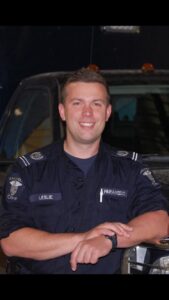
Tyler has filled various roles at Algonquin College since 2010, most recently as the Field Placement Officer for both the Paramedic and Advanced Care Paramedic Programs. He works closely with local Paramedic Services, hospitals, and healthcare organizations to facilitate the most progressive field learning experience possible.
Tyler holds a Bachelor of Health Sciences degree from Thompson Rivers University. He is a 2008 graduate of the Algonquin College Paramedic Program. Tyler completed the Advanced Care Paramedic Program, also at Algonquin College, in 2011.
Since 2008, Tyler has been a proud member of the Ottawa Paramedic Service (OPS), currently holding the rank of Operations Superintendent. He spent most of his career in Special Operations as a member and Team Leader of the Paramedic Support Unit. There, he worked as the lead medical instructor for multiple specialty units of local, provincial, and national policing agencies.
Tyler has received several awards and honors including; Algonquin College Part-Time Support Staff Award (in recognition of excellence supporting the success of students, colleagues, and clients) and the City Managers Award of Distinction in the field of innovation (the highest distinction possible for City of Ottawa employees). Tyler has an interest in innovative paramedic programming and believes strongly in education-based industry advancement.
Tyler is an avid outdoorsman, spending his spare time snowboarding, hunting, backcountry canoeing and camping with friends and family.
Natalie Lavergne
Professor
Room P112
Throughout her career, Natalie has been involved in didactic, clinical, and preceptorship delivery at PCP, ACP, and CCP levels of care. Natalie has been working for the air ambulance since 2001, received her Critical Care Paramedic level in 2003 and completed additional training in pediatric critical care in 2009. Natalie holds a Bachelor of Science in Biochemistry from Ottawa University and is currently working as a Critical Care Paramedic and Field Educator for Ornge, an Education Facilitator for RPPEO, and an Instructor for the Paramedic and Advanced Care Paramedic programs at Algonquin College.
Jun Steele
Professor/Technologist Academic
Room P123A
Sara MacGregor
Professor
Sara holds a Bachelor of Health Sciences from the University of Ottawa, and a Bachelor of Neuroscience and Mental Health from Carleton University. Throughout this time, Sara focused on bereavement support in pediatric palliative care at The Roger Neilson House, as well as post-anesthetic care in the Surgical Unit at The Ottawa Hospital.
Sara also comes from a background of health and fitness with over 10 years of experience in personal training, as well as competitive weightlifting. With her experience and passion for coaching, she plays an active role in teaching others about health and wellness.
She received her Primary Care and Advanced Care Paramedic diploma from Algonquin College and is a proud employee of the Ottawa Paramedic Service. Sara is committed to helping others succeed, and is active in the student precepting process as well as mentoring new employees.
Since 2017, Sara has had the privilege of fulfilling many roles within the Primary Care Paramedic Program focusing on fitness, practical, and theoretical knowledge. She truly enjoys being a part of the world of education and strives to promote a safe and supportive learning environment
Pasan Fernando
Professor
Alyssa Ferns Ph.D.
Professor
Room P112
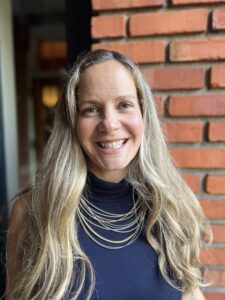
Alyssa Ferns is a full-time professor with the Police and Public Safety Institute. She holds a Ph.D. and M.A. in forensic psychology from Carleton University, and a B.A. from the University of Guelph. Prior to working at Algonquin College, she was a full-time professor and program coordinator for the Bachelor of Social Science (Criminal Justice) at Humber College. Alyssa is an applied researcher who has had the opportunity to work with the Toronto Police Service, the RCMP, and Correctional Services Canada. She has been awarded research grants from both Social Science and Humanities Research Council (SSHRC) grants and the Canadian Institutes of Health Research (CIHR). Her projects have related to police use of force decision making, neighbourhood policing, vicarious resilience of service providers, and concussion recovery for intimate partner violence survivors. She currently works with the Victimology Research Centre at Algonquin and is passionate about worker wellness for all first responders. She enjoys teaching courses related to mental health, psychology, and research methods.
Chris Martin
Professor
Room P112P
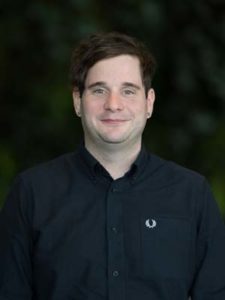
Chris Martin is a full-time professor with the Police and Public Safety Institute. He holds a PhD and MA in sociology and a Criminology Certificate from Memorial University of Newfoundland. Currently, he teaches courses in sociology, ethics and professional development, and research within the Paramedic and Police Foundations programs. He has also served as the General Education Coordinator for the Faculty of Health, Public Safety, and Community Studies and is currently a member of the Research Ethics Board for Algonquin College. He is the author of the book The Social Semiotics of Tattoos: Skin and Self (Bloomsbury Academic). He has also published book chapters and scholarly journal articles for a range of publications, such as Oxford University Press, Cambridge Scholars Press, and the Public Journal of Semiotics. Dr. Martin is a past recipient of the Dianne Bloor Part-time Faculty Award for teaching excellence at Algonquin College. He continues to do research involving subjects like tattooing, identity, semiotics, and street-art. In his spare time, he enjoys playing guitar, reading and writing, and spending time with his wife and two young daughters.
Husam Ali
Professor
Husam, he/his/him, is a Paramedic with 4 years experience on the road. He enjoys patient interactions and takes a holistic approach to care and assessment when appropriate.
Husam has worked with Algonquin College for the past 2 years aiding with teaching in the first year paramedic lab. He enjoys interacting with students and guiding the practical aspect of skill development.
He holds a diploma of Primary Care Paramedicine, a certificate of Advanced Care Paramedicine, and a bachelor’s in health studies. Husam enjoys expanding his knowledge in the profession through research and continuing medical education, both formal and informal.
Outside of work and education Husam volunteers with small community groups in Ontario that aim to provide basic medicine and supplies to civilians and care providers in war-torn nations.
He enjoys playing and watching sports and spending time with family, friends, and colleagues.
Brittany Parr
Professor
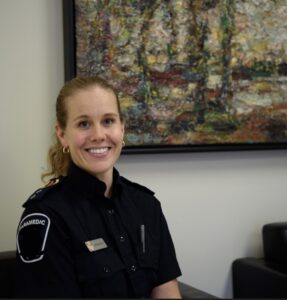
Brittany brings a wealth of experience and dedication to her role at Algonquin College, where she has been a faculty member since 2014 teaching Lab for both the Advanced Care and Primary Care Paramedic programs. With 16 years of hands-on experience as a Paramedic, Brittany’s career has been marked by her commitment to excellence and leadership in the field of emergency medical services.
Currently, Brittany holds a leadership position with an urban paramedic service in Eastern Ontario where she leverages her extensive field experience to drive advancements in emergency care and operational efficiency. Her strategic vision and deep understanding of the challenges faced by first responders make her a valuable asset in shaping the future of paramedicine.
In addition to her practical work, Brittany serves as a Board of Director on the Ottawa First Responder Foundation. Her involvement with the Foundation highlights her dedication to supporting and improving the well-being of first responders within the Ottawa community.
At Algonquin College, Brittany is known for her engaging teaching style and her ability to inspire and mentor students. Her classes are enriched by her real-world insights and her passion for developing the next generation of emergency medical professionals. Brittany’s contributions to both the academic and practical realms of paramedicine reflect her unwavering commitment to the profession and her students.
